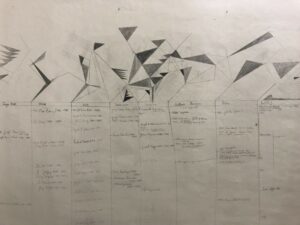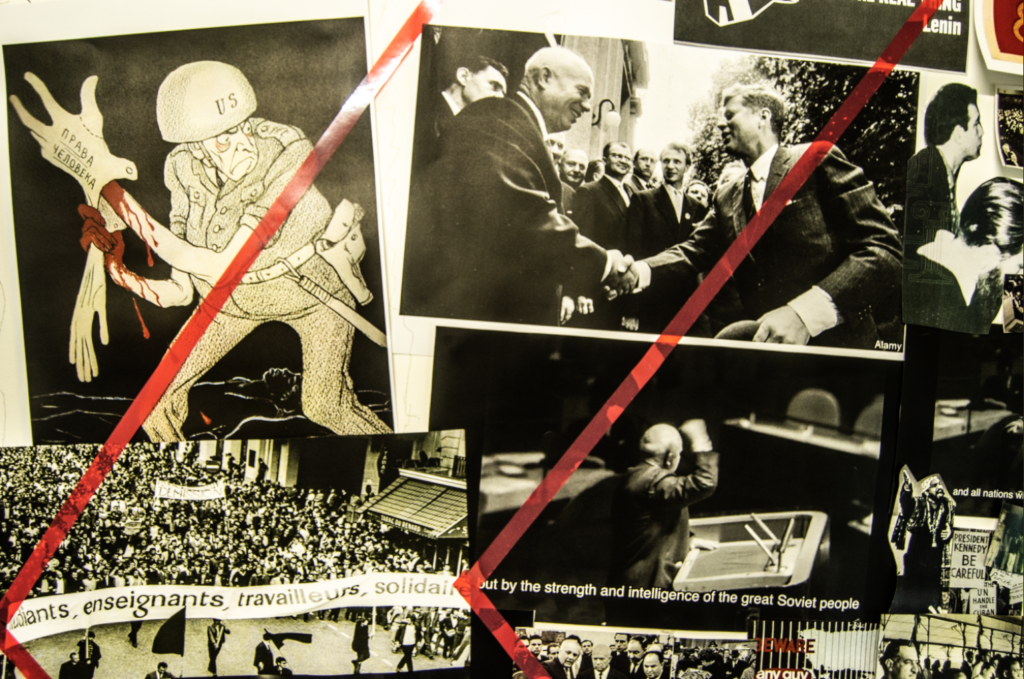
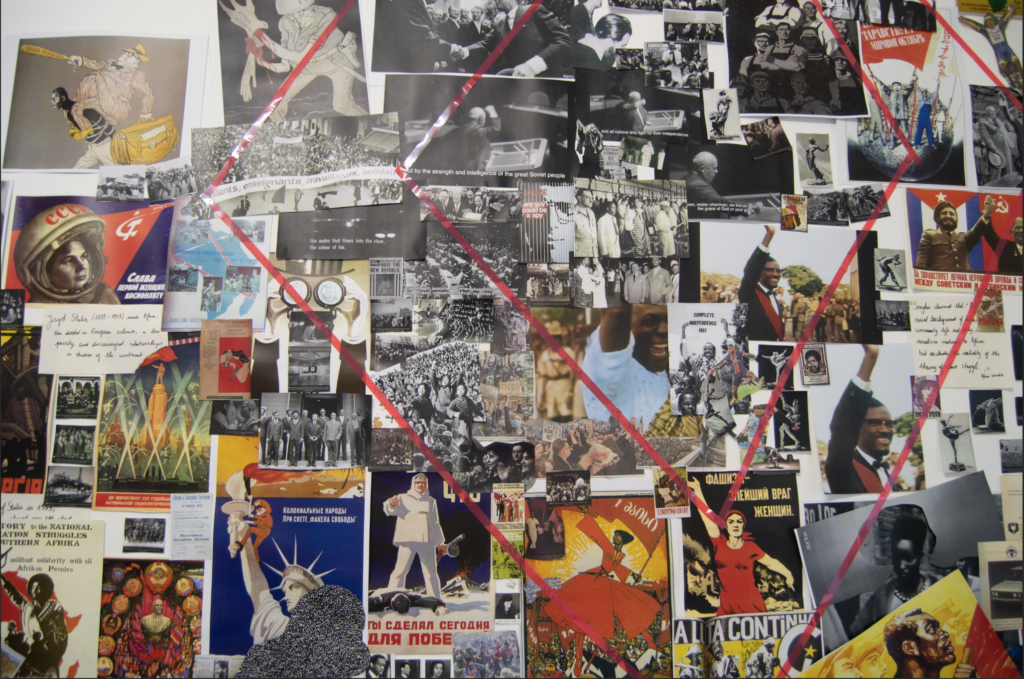
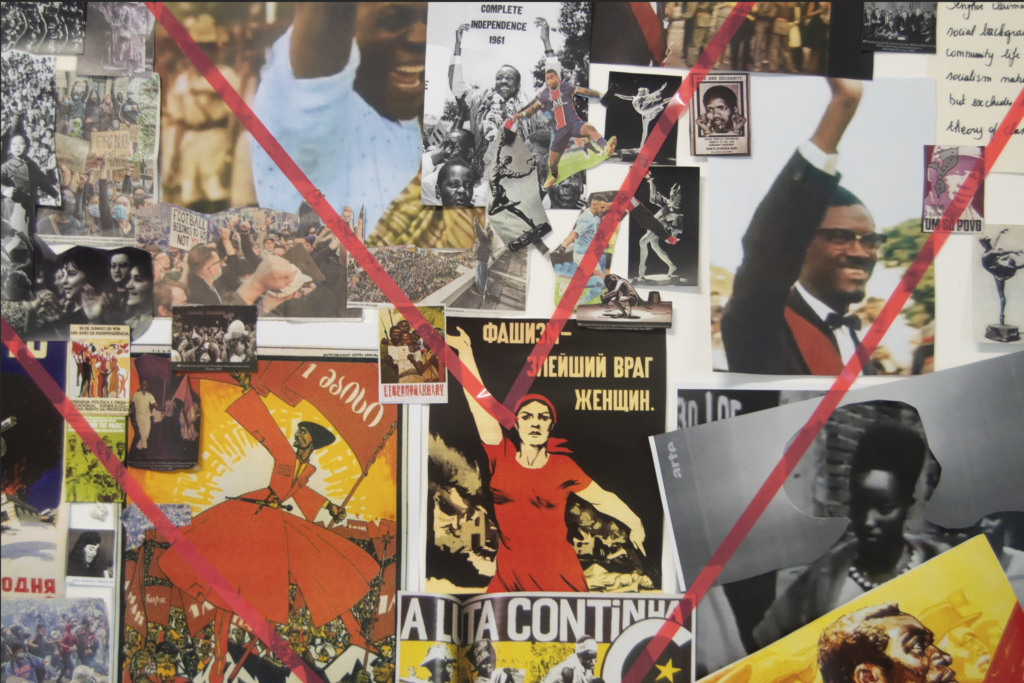
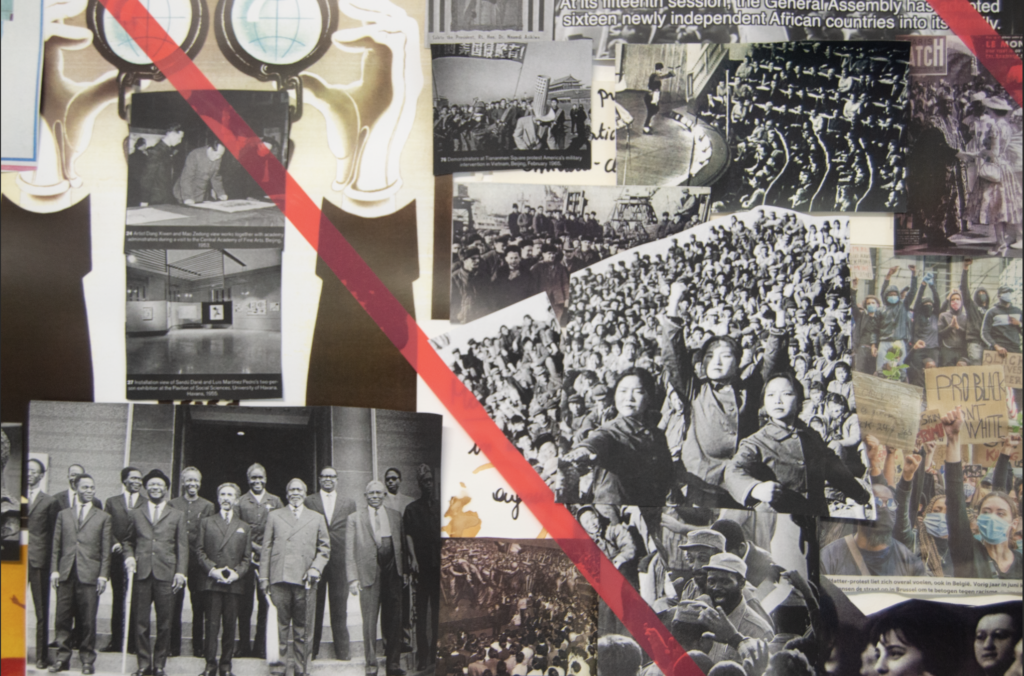
In Search of Gilbert and Idrissa: African Students in the USSR. Artistic Research through the Development of Fictional Characters
From 1917, during the Russian revolution, all the way through to the late 1980s, the Soviet ideology that advocated Marxist ideals of color-blind internationalism and solidarity among the “oppressed of the world” resonated throughout the globe—including in the colonies, where social and racial inequality were an inseparable part of society. Intellectuals from different parts of the world—on the African continent, the Caribbean, as well as the Americas—saw the Soviet Union as a meeting point and thus a cradle for many communist-inspired revolutionary ideas. For the Soviets the 1950s was characterized by a growing interest in the development of long-term relationships with several countries on the African continent. This happened through Joseph Stalin’s successor Nikita Khrushchev. These stimulating interactions between the Soviet Union and the expanding independence movements on the African continent culminated in the symbolic organization of the 6th World Festival of Youth and Students in 1957, where several delegations of African students were welcomed to Moscow. The festival attracted 34,000 people from 130 countries. Subsequently, on 5 February 1960, the Peoples’ Friendship University of Russia (RUDN University), was established in Moscow. Soon the university was renamed after the murdered Congolese politician Patrice Lumumba and the official name became Patrice Lumumba Peoples’ Friendship University. Students from Asia, Africa, and South America were given the opportunity to become specialists in various fields, in order to contribute to the construction of their newly independent countries.
In 1961, the urgency for education was confirmed during the Conference of African States in Addis Ababa which was dedicated to this issue. Due to a shortage of cadres in the aftermath of the independences, the number of African students in the Soviet Union increased drastically to over 5,000 by the end of the 1960s. Up until the mid-1970s, the Soviets had developed relationships with radical strands of the independence movements in Angola, Benin, Ethiopia, and Mozambique, some of whom fought for their independence with the support of Soviet militias. By 1990, on the eve of Soviet collapse, the number of African students had risen to 30,000, or 24 percent of the total body of foreign students. The reason why students chose to study in the Soviet Union varied from them simply looking for an educational opportunity, to them being attracted by the socialist experiment and looking for an anti-imperialist experience.
My interest in the geopolitical and artistic relations between the Soviet Union and the African continent—as well as the experience of African students in the Eastern Bloc during the Cold War—was triggered by coming across a letter from Moscow in my family archives, sent by a family friend, who was a Rwandan studying near Moscow during that time. Both the period and this geographic encounter had also previously caught my attention, as several renowned filmmakers from the African continent had studied in the Soviet Union and carried home the renowned form of Soviet montage in their films—filmmakers Ousmane Sembene, Sarah Maldoror, and Abderrahmane Sissako, for example.
I started my research by exploring both the political and artistic interrelations in all the “layeredness” of the 1960s and 1970s, trying to gain an insight into the geopolitical dynamics of the Cold War, and their entanglements with the politics on the African continent after its many independences—taking particular interest in what the experience of individuals studying in the Soviet Union through a scholarship would be like. This research not only challenged my perceptions about that period in time—myself being of the generation that was raised after the fall of the Berlin Wall—but started to give me a deeper comprehension of this turbulent but also insightful period of society.
Little is known about the personal experiences of the African students, their personal lives, personal positioning, and negotiation with the communist ideology, nor their trajectories after their return to their homelands. Using a screenplay as a research method allows entry to this unknown space. Through the figures of Gilbert and Idrissa, the story’s protagonists, I want to explore the historical potentiality of two intersecting narratives: postcolonial and East European, as a refuge from a geopolitically constructed western reading of history. Being born in Rwanda, mostly raised in the west—in Belgium—has framed my perception of history, and by extension, my imagination and understanding around the Cold War and Eastern Europe. The experience of being perceived as a migrant enabled me to question and acknowledge the geopolitical ingredients in the imposed notions of history and, particularly, which histories are told. Therefore, I used counternarratives coming from more informal archives in the development of my research, such as oral histories and family archives.
My research resulted in the performance of a written screenplay, surrounded by a mapping of historical images in my studio during my residency at Wiels, Centre for Contemporary Art, Brussels. The performance—and its projections and the misunderstandings that unfolded in the collage of historical images and personal dialogues—was an experimentation in rehearsing ways of engaging with oral knowledge beyond reproducing the violence inherent as much in the Cold War era as in the present world.[1] [1]
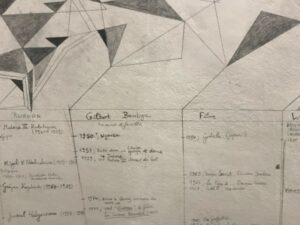 [3]
[3]Screenwriting as Artistic Research
Int. General Assembly United Nation. End of the afternoon.
12 October 1960
A Soviet man, small in stature, about 50 years old, walks up the steps nervously. He sits down in front of the microphone, looks at the assembly. His posture is straight. His arms are up. There is a silence. He looks down at his notes he took on a little paper. He sits down in front of the microphone, looks at the assembly with a confident air, opens his mouth and speaks.
Nikita Khrushchev
(with a tone of commitment)
I am glad to have this opportunity,
on behalf of the Soviet people,
to welcome the young independent
African states
which have recently
joined the United Nations
and to wish them prosperity
and success.
Our century is the century
for the struggle of freedom,
the century in which
nations are freeing themselves
from foreign domination.
The peoples aspire to a
dignified life
and are fighting for it.
Victory has already been
wining many countries and lands.
But we cannot rest on our laurels,
for we know that tens of millions
of human beings are still languishing
in colonial slavery and
suffer serious hardships.
The body of Nikita Khrushchnev becomes stiffer each word he utters. The tone in his voice is hard to define, it seems like something between anger and passion. Every word’s value is recognized by a very expressive and precise articulation.
We are in a period that we call
that of the great and promising
scientific discoveries.
We have designed the atomic bomb[2] [4]
and we are penetrating
the mysteries of the
structure of proteins.
The extent of our knowledge
is a source of astonishment
even to ourselves.
Nikita Krushchev stops bends down, and disappears from our view. Restlessness in the company. Whispers occurs in a nervous tone. It’s like he vanished. He reappears with one of his shoes in his hand. The noise of his shoe gives a rhythm to the continuation of his speech.
*tap*
(Almost yelling)
*tap*
“This life, itself,
depends on the effective
power of the Pacific States,
and the support
of the overwhelming
majority of humanity.
Life cannot be reduced
to simple geometric rules,” [3] [5]
“If, instead of plundering
and exploiting,
the metropolitan states.
If, instead of plundering
and exploiting,
the metropolitan states
had been truly guided
by the interests of the colonial people,
if they had really given
them the help they needed,
the people of the
colonies and metropolitan countries
would have developed uniformly.
Instead of presenting such striking
differences in the development
yes, in the development of
their economy, their culture and
their national prosperity.”
Nikita Krushchev looks at the assembly with an inquisitive gaze.
Look at what is happening
in the colonies.
Africa is bubbling and
bubbling like a volcano.
His voice replicates the voice of a bubbling volcano.
No one can dispute the fact that
the Soviet Union has spared no effort
to ensure the continuation
of this happy trend in the development
of international relations.
Nikita Krushchev looks at the assembly and takes a deep breath to continue his speech.
Int., Oval office, Washington D.C, United States, Night.
5 September 1961
A rather handsome white man of about 40 years old with brown-ish-blond hair, is sitting at his desk. He seems tired. The dark circles under his eyes are marked. He sips in a rhythmic manner from his whiskey. He takes the first from the stack of letters in the corner of his desk.
On the letter, written in elegance. ‘Letter to President John F. Kennedy from the Non-Aligned Movement’.
John F. Kennedy whispers out loud:
“We, the Heads of State and Government of our respective countries participating in the Conference of Non-Aligned Countries held in Belgrade from September 1 to 5, 1961, take the liberty of addressing Your Excellency on a matter of vital and immediate importance to all of us and to the whole world. We do so not only in our own name, but at the unanimous request of the conference and of our peoples.”
“We are distressed and deeply concerned at the deterioration of the international situation and at the prospect of war which now threatens mankind. Your Excellency has often emphasized the terrible nature of modern warfare and the use of nuclear weapons, which may well destroy humanity, and has pleaded for the maintenance of world peace.”
“… we urge the opening of direct negotiations between Your Excellency and the Chairman of the Council of Ministers of the Union of Soviet Socialist Republics, who represent the two most powerful nations today and, in whose hands, lies the key to peace and war. We are convinced that, devoted as you both are to world peace, your efforts, through persistent negotiations, will lead to a breakthrough in the present impasse and will enable the world and humanity to work and live-in prosperity and peace.
We send this identical letter to Mr. Nikita Khrushchev, Chairman of the Council of Ministers of the Union of Soviet Socialist Republics. “
The phone rings. Kennedy takes another prolonged sip from his glass of whiskey.
John F. Kennedy
(tiredly)
Yes, Yes …
…
I am coming…
Keep some food
for me
…
J.F. Kennedy
(exhaustedly exhales)
…
Yes, Yes, of course
…
I was finishing something
Yes of course, I am coming
Kennedy hangs up the phone. He takes a notebook and carefully notes the names of the officials who had signed the letter. While writing the names down, he reads them out loud and practices the pronunciation of their names.
Cyrille Adoula, Prime Minister of Congo and Minister of National Defense
Haile Selassie I, Emperor of Ethiopia
Dr. Kwame Nkrumah, President of the Republic of Ghana
Aden Abdulle Osman, President of the Republic of Somalia
El-Farik Ibrahim Abboud, Chairman of the Supreme Council of the Armed Forces and Prime Minister of the Republic of Sudan
He closes the notebook. He caresses with his forefinger on the title of the book, which reads ‘African Statesmen,’ written on the cover with a red marker.
*
Ext., Square in front of a University, Voronej, Soviet Union. afternoon.
11 September 1972
A large, sleek building. White with yellow tones. The type of building that exudes authority and work ethic. In front of it, a snow-covered grassy plaza. Sound of steps crunching in the snow. A group of boys step up to the building. The first in the group has to use force to open the door.
*
Int., Eating Room in Dorm, Voronej, Soviet Union. Evening.
11 September 1972
The walls are decorated in two colors, red and white. The room looks empty and is filled with dinner tables. Two groups of students are sitting in both corners, at both ends of the room. In one corner sits sitting a group of Russian students and in the other corner sit two Black African students. One of the students eats with large spoons, the other looks at his plate somewhat doubtfully. The radio is on, a voice seems to read the latest news in Russian.
Gilbert
Idrissa! What’s the matter?
You have such a strange look
on your face.
Idrissa
It’s only the food that manages
to warm me up. It’s so cold.
Aren’t you cold?
Gilbert
What a joy, this snow!
It is so beautiful!
So white…
but so cold.
I’ve never seen
anything like it.
Idrissa
Winter has barely begun
and it is already -15°C.
Gilbert
You’ll get used to it!
Idrissa
Never!
Gilbert
By the way, What are your first
Impressions of the Soviets?
Idrissa
They’re all drunks…
and very funny!
they told me about it
I heard about the soviet humor.
but this… haha
had to laugh so hard
last night!
Gilbert
Ha ha!
I have a good impression.
I feel like they are nice.
Especially to foreigners.
Idrissa
The women by the way
some of them are a bit cold
and others are really interested
in the clothes that I wear,
the music I listen too
even the watch, I am wearing.
Like really obsessed
With everything that comes
from the outside.
Gilbert
You have to understand:
on the radio, on TV
In the newspapers,
they only talk about
The Soviet Union and
the socialist states…
It’s normal, isn’t it?
Wouldn’t you be interested what
comes from outside?
besides, there are some surprises, no?
Idrissa
Like what?
Gilbert
Well, contrary to what
I was told home.
There is freedom of worship here.
In theory, everyone practices as they wish.
Idrissa
Oh yes, didn’t you go
to church the other day?
Gilbert
But yes, when I talk to
the Soviets I see that
they have an atheist
upbringing from
a very young age.
But the contradiction:
the old people,
on the other hand, believe
in God and they even
attend church a lot.
When I was there,
they were all old people!
*
Backstory
Gilbert Basebya:
Gilbert is born in 1952 in Rwanda. He’s the first born of a family of 6 children. He was 10 years old, when the Rwandan Independence was announced. Thanks to a family friend, he could attend the prestigious seminary school, a school owned by Belgian priests. All the scholarships to the United States where already given to students that were friends with the government. That was initially his choice. He passed by the Russian embassy, as they were known to give scholarships easily. It would be his way, to study abroad and come back with a degree, maybe pass by the West. If possible.
Int. Dining room. Dormitory. Voronezh. Soviet Union.Afternoon.
5 February 1973
Idrissa
(joyfully)
Ah Gilbert! Happy New Year!
Tell me how
the new year party was.
Gilbert
(excited)
Aha, all the Rwandans were
together with some friends.
It’s a good thing to study abroad:
This opportunity to meet students
from Vietnam, from D.R.A.,
Latin America, and Asia.
Idrissa
How was it?
Gilbert
We get to talk, for a long time.
And you know Idrissa, actually,
I’ve noticed that their problems
are not different from ours.
You realize that there are more
than 25 countries represented
in this university?
Idrissa
Yes, I met yesterday
For the first time
different Malagasy
and Nigerians.
By the way,
did the exams go well?
Gilbert
I am so proud of my fellow students:
They all passed their exams well.
We did not disappoint them!
They always have
a good impression of us!
Idrissa
I sense a real fear among
my Russian friends of losing
their scholarships.
Gilbert
The Soviets rate all the works
on 5 points, 5 = YB, 4=B, 3=AB, 2=M.
The Russian students normally
have a scholarship of 40 rubles,
when a student receives 5 points
during a year the scholarship
is increased to 100 rubles.
When a student receives 4,
he passes but his scholarship
is not increased.
If a student receives 3 points,
he passes, but does not receive
a scholarship and is kicked
out of the university residences.
Idrissa
Oh really?
This is intense, right?
Gilbert
So, all the Russian students
work a lot for fear
that their scholarship will be cut.
But I have to admit,
I think that such a system
can stimulate
the students’ work.
Here, everything is provided for
the students to study well.
Books cost almost nothing.
Books that cost 2000 francs at home
do not cost even one ruble here.
And every night there is a teacher
available for students.
Idrissa
Yeah, I see your point of view.
Let’s discuss this with other students,
And see what they think about it.
*
Backstory
Idrissa Kamara:
Idrissa was born in 1950 in Guinea-Bissau. When Idrissa arrived in the Soviet Union, Guinea-Bissau was still fighting for its independence from Portugal. That would last from 1963 to 1974. Guinea-Bissau in its independence war was, among others, backed by Cuba, the Soviet Union, Romania, and Yugoslavia. Idrissa ended up studying in the Soviet Union, due to a family friend. The family friend was a member of the communist party of Guinea Bissau, he could fix a scholarship to study abroad, in Russia, in the Soviet Union. Idrissa saw it as an opportunity to study abroad.
Int. Sleeping room. Dormitory. Voronezh. Soviet Union.Afternoon.
20 March 1973
Gilbert lies in bed, dressed and staring at the wall. Right in front of him, Idrissa, is sitting in a chair. They talk seriously.
Gilbert
(worried)
Idrissa, you’ve hardly
eaten at all.
What’s going on?
Idrissa
(in a cold tone)
Do you know who
Amìlcar Cabral is?
Gilbert
Yes, yes,
He wrote about
Marxism, didn’t he?
Such an interesting
and fascinating man.
I remember a quote from him,
which I liked,
I think it was:
“Christians go to the Vatican,
Muslims to Mecca
and the revolutionaries
to Algiers.”
Idrissa
I have some bad news:
I received a letter
from my mother
this morning.
…
She told me that
Amìlcar Cabral is dead.
He was killed. I don’t have
any more details, yet.
A silence of a few minutes, pain and anxiety are suddenly strongly felt in the room.
Gilbert
(in a serious tone)
This brings me back
to all the murders
following the independences:
Patrice Lumumba,
with his unpredicted speech,
Louis Rwagasore,
the immense bright mind,
and for Rwanda,
the king, Mwami Mutara III,
who mysteriously died,
in a hospital in Burundi,
after he started confronting
the Belgians.
This is exactly
why I didn’t want to study in Belgium.
Idrissa
You know Gilbert…
never forget…
that those powers that try
to “modernize” us,
or who supposedly
have the authority of “morality”,
are the ones who
created an atomic bomb. [4] [6]
Can you imagine that
they used it?
So that’s when you realize.
When they talk about sauvages.
They actually talk about
Themselves.
Gilbert
It’s so scary,
All that.
Idrissa
You know, the fear of
a lot of my friends,
a lot of students,
was to be sent
to the Soviet Union.
Gilbert
Why is that?
Idrissa
First, they thought that in this country
the studies were too “easy”
and especially those who come back from here
were not looked at with the same
admiration as those who came back from
France, for instance.
The communist ideology, is and
was fashionable in the discussions,
but it ended up revolting some of us,
and we did not wish to go
to the country, which in our eyes,
had replaced the former colonial powers.
You know, that our leaders were
inspired by Soviet governance?
To the point of maintaining
the cult of personality typical of the USSR?
You know, Gilbert.
I think a lot about: what comes after this?
Going back.
I remember an uncle coming back with
a degree of the Patrice Lumumba University.
But you know, a degree from the
Sorbonne is way more respected.
Gilbert
(worried)
I think about it a lot, too.
About my life after this…
Hope it was all worth it!
5 Years Later
Int., Sleeping room, Odessa, Ukranian USSR. Evening.
5 May 1977
Gilbert is sitting at his desk, pencil in hand, drawing a plan of action on a blank sheet of paper. Idrissa knocks on the door and enters in the room. Gilbert ignores him and keeps on writing.
Idrissa
What the hell are you doing?
Gilbert
We, the Rwandan students,
are preparing a big strike.
Idrissa
But, why? Are you sure?
This can be dangerous.
Gilbert
We have been asking
a long time for
the Rwandan government
to grant us
holidays back home,
but so far,
the government
has been silent…
I don’t know
if you understand,
how we live in
difficult situations.
Spending six years in the USSR
without returning home!
Can you imagine?
Idrissa
But it’s difficult
for everyone?
Your compatriots?
What do they think?
Gilbert
But everyone agrees!
It’s very difficult to handle,
and many people
become mentally deranged.
Idrissa
But what are you going to do?
Gilbert
We are thinking of going
on a general strike
until our demands are met.
Idrissa
But how are you organizing this?
Gilbert
Across the whole territory of the USSR
Rwandan students have held
meetings to study
how the strike would be conducted.
Idrissa
But the Soviet authorities,
how will they react?
Gilbert
I don’t know. We’ll see.
Int. Dining room. Odessa, Ukranian USSR. Evening.
25 April 1977
Idrissa and Gilbert are sitting silently in the corner of the dining room. They both look a little stressed. They have trouble eating the food on their plates. They speak very silently. The conversation is hard to understand.
Idrissa
(in a nervous tone)
I have to tell you something, Gilbert.
I’ve been talking about your strike plans
with a good friend of mine.
Gilbert
I asked you to be discrete
about this!
Idrissa
I mentioned it to James,
that Ghanaian student.
You know him,
he’s trustworthy!
He said something
That might interest you
Gilbert
What did he say?
Idrissa
That about 15 years ago, a group of
Ghanaian students went on strike to address
the mysterious death of one
of their fellow students.
He was found dead in the snow
some weeks before his wedding
to a Russian girl.
Gilbert
What a horrible story!
How did the Soviet react to this strike?
Idrissa
That’s what I wanted to speak to you about
…
At that moment it was Krushchev,
the head of state.
He reacted really vividly.
He declared that Africans could dance on
their heads at home, but that
they would not allow demonstrations again
in the USSR
Can you imagine?
He then offered exit visas to those students
who didn’t like the treatment
they are receiving here.
Just, be careful
Gilbert…
Is this worth it?
Gilbert
(calmly)
Thank you for letting me know this.
But I can’t let fear run my life anymore.
Int. At a party in a bar, Odessa, Ukranian USSR. Night.
15 June 1977
A pub with sparse lighting, very quiet classical music in the background. The sound of bottles on the tables make the music almost inaudible. Several groups of men are in the pub. Idrissa and Gilbert are sitting in a dark corner. A half empty bottle is between them on the table.
Idrissa
So how did it go
with your ideas to invade
the Rwandan embassy?
Gilbert
Look, our plans were aborted.
The authorities noticed
the uneasiness which reigned among us,
and to stop any enterprise
of the students
against the embassy of Rwanda,
armed militiamen were placed.
It became impossible to do anything
against the embassy and in our plans,
the last measure was to invade the embassy
and drive out the ambassador.
Idrissa
But what did you do?
Gilbert
We decided to take the legal route,
and asked the Soviet
Ministry of Public Education
permission to send a
delegation to the embassy.
The delegation was received by
the ambassador, who answered that
he had not received any order from Kigali and that our requests were still under consideration.
The delegation returned unsatisfied
And we started the strike.
The Rwandan students refused
to attend classes until
their demands were met.
Idrissa
But how did the Soviets react?
Gilbert
They threatened to expel
all the leaders of our organization
if we didn’t calm down.
So, on the request of
the central committee,
we stopped the strike.
But this story is not over,
Idrissa.
We decided to start it again
if the Rwandan government
continues to keep silent.
Idrissa and Gilbert order one last drink for the road.
*
[1] [7] I would like to thank Anna Smolak, independent curator, for giving me the opportunity to perform this screenplay as part of the program Lectures on the Weather in Snagov, Romania, and through conversations helping me to find the words to explain what the experiment was about.
[2] [8] The performers pronounce the word together.
[3] [9] This is a term that was suggested by an automatic translation. Although this may seem like an incorrect translation, I chose to keep this term. As it is an interesting lapsus for what is actually meant.
[4] [10] The performers pronounce the word together.
Bibliography
Julie Hessler, ”Death of an African Student in Moscow”, Cahiers du monde russe 24, no. 1–2 (2006).
Constantin Katsakioris, “Transgresser les frontières de la Guerre froide. Militants, intellectuels et étudiants africains en Union soviétique, 1956-1991,” Présence Africaine, Nouvelle série, 175/176/177, (2007/2008).
Mark Nash, Red Africa: Affective Communities and the Cold War, (London: Black Dog Press, 2016).
Jean-José Maboungou, “Voyage en Brejnevie: Vie ‘Rêvée’ des étudiants du Tiers-monde en Russie soviétique ,” Cahiers d’études africaines 226, (2017).
Maxim Matusevich, “Journeys of Hope: African Diaspora and the Soviet Society,” The African Diaspora 1 (2008), pp. 53–85.
